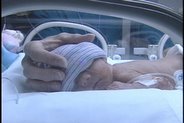That's the first thing that came to mind when I read the abstract for a study published in the Proceedings of the National Academy of Sciences, entitled Space flight alters bacterial gene expression and virulence and reveals a role for global regulator Hfq. Researchers discovered that strains of Salmonella that were sent into outer space changed and became more virulent.
Here's a bit of the study's findings via Natural News, by reporter David Gutierrez:
"Researchers placed strains of Salmonella typhimurium, a common food-poisoning agent, into two separate containment canisters. One of the canisters was sent into outer space for 12 days, while the other remained in the Orbital Environmental Simulator at Kennedy Space Center. The environmental simulator remained in constant communication with the space shuttle, immediately replicating in real-time whatever temperature and humidity conditions were being experienced in the vessel. This allowed the two groups of bacteria to be exposed to identical conditions, except for the fact that one group was under microgravity conditions in outer space."
The Salmonella taken into space returned with changed expression of 167 different genes, a sign that microorganisms adapted to the zero gravity environment. Although the Andromeda Strain dealt with extraterrestrial bugs, and this study examines terrestrial bugs, imaginative people could find parallels.
How does this relate to airborne infection? This research confirms that nature will always try to adapt to survive in its environment. Antibiotics have worked well for many years, but now nature has adapted yielding 'multidrug resistant organisms, AKA Super Bugs. VIGILAIR® inactivates viruses, bacteria and fungi by corrupting the genetic map that organisms need to reproduce.
So, NASA, call whenever you're ready, operators are standing by...


No comments:
Post a Comment